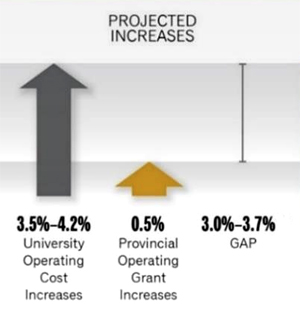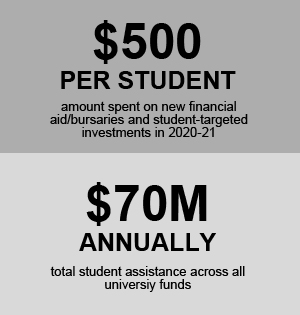The following memo was distributed today to all Dalhousie students, and is being shared here on Dal News as well.
Our thanks to the more than 1,300 students who took the time to respond to our Budget Advisory Committee (BAC) survey on tuition, fees and the Dalhousie operating budget.
We greatly appreciate your thoughts, views and insight as we work to develop a balanced budget that supports students, faculty and staff, and Dalhousie’s mission. We also recognize the significant burden the pandemic has placed on students over the past year and, please know, we are working hard to provide a higher level of student financial supports while at the same time meeting our fiduciary duty for a balanced budget.
The BAC has released a revised budget plan, now available at dal.ca/budget, which includes final tuition and fee recommendations that will be brought to the Board of Governors for approval in April. A summary of student feedback can be found in Appendix [E] to the Budget Advisory Committee report.
In response to student feedback, the updated plan includes further increases to financial aid and student support, to a total of $3.5 million in new, additional funding compared to pre-pandemic levels, while maintaining the 3% general tuition fee increase from the draft plan shared in late February.
With that said, we want to address some of the most consistent feedback we received from students, providing further explanation on the fee increases and how we’re working to ensure that our investments reflect your priorities.
Why tuition increases are necessary
Tuition increases each year as costs to run the university increase by more than our government funding does. Most of this is due to compensation increases required by collective agreements (salaries, benefits and pension payments) for the faculty/staff who deliver our courses, programs and services. (Compensation makes up nearly 75% of the budget.) There are also other important investments  needed to support our university community: classroom and building repairs, student financial aid and assistance, technology supports, and many other strategic and essential priorities identified in the budget.
needed to support our university community: classroom and building repairs, student financial aid and assistance, technology supports, and many other strategic and essential priorities identified in the budget.
Without tuition increases, that gap between rising costs and government funding — roughly $14.1 million in the draft budget — would come entirely out of Faculty and unit budgets, requiring deeper cuts into academic programming, student supports and other essential priorities. Even with a 3% tuition increase, the budget plan will still require Faculties and units to find 1.5% in cost savings next year to help balance the budget.
*cost increase before annual cost reductions are applied to Faculty and unit budgets
Dalhousie has two primary sources of funding that comprise 91% of budgeted revenue: the government grant and tuition revenue. We know what the government grant is: it will increase by 1% (amounting to a 0.5% increase to overall revenues) and that is built into the budget. Tuition is the only other means available to Dalhousie to generate revenue and balance the budget. This is why Dalhousie has needed to raise general tuition by 3% annually.
Investing in students
We know the impact of tuition fee increases can be significant to students even if they are anticipated. This is particularly true for students with substantial financial need. That’s why Dalhousie works to pair tuition increases with increases to student financial aid — an approach that balances Dalhousie’s budgetary need for tuition revenue with investments that support access to education for those who need support the most.
 This current academic year (2020-21), Dalhousie has spent an average of $500 per student on additional financial aid/bursaries and on new targeted investments in teaching and learning and student-focused priorities. Dalhousie spends more than $70 million each year on student assistance across all university funds (including research, endowment, etc.)
This current academic year (2020-21), Dalhousie has spent an average of $500 per student on additional financial aid/bursaries and on new targeted investments in teaching and learning and student-focused priorities. Dalhousie spends more than $70 million each year on student assistance across all university funds (including research, endowment, etc.)
Through your survey responses, you told us that student assistance and other student-focused investments should continue to be top priorities. The revised budget plan for this upcoming year commits an additional $3.5 million in student funding, including an extension of increased bursary support to address continued financial pressures of the current pandemic along with an increase to support student employment on campus. In addition, we can anticipate strategic initiatives allocations will support investments towards other priorities identified in survey responses, including online infrastructure, training and support for faculty, and mental health supports and study space.
COVID-19 and online learning
Many of you asked why Dalhousie is raising fees despite online learning and the current pandemic.
The good news is that for this upcoming year, as we’ve communicated previously, Dalhousie is planning for significantly increased in-person learning in the fall, followed by a winter term that should be much more like our normal academic experience.
We know the past year has been challenging and far from ideal for teaching and learning, as many of your survey comments pointed out. Our priority has been to ensure students can safely continue their programs of study during this extraordinary period, increasing supports wherever possible along the way — academic, financial and otherwise — and helping instructors find ways to improve the virtual learning experience.
For all that was different this year, however, the costs Dalhousie incurred to deliver your education did not go down. As outlined above. nearly three quarters of Dalhousie’s budget pays for our dedicated and talented faculty and staff who have worked exceptionally hard this past year. There have also been some new costs because of the pandemic — increased bursary support for students, investments to improve online teaching and learning — while revenue declines in ancillaries (residence/food/conferences) and in athletics and recreation put further strain on the budget. Dalhousie also waived fees in areas where services were less available this year (like fitness fees) — a savings of more than $400 per full-time student.
Even with the 3% tuition increase in 2020-21, Dalhousie would have run a deficit if not for a one-time grant from the Province of Nova Scotia to help cover COVID-19’s financial impact on universities in the province Simply put, COVID-19 did not change Dalhousie’s fundamental budget reality, which requires annual tuition fee increases to avoid significant cuts to programs and services.
We are excited to resume more in-person learning this upcoming year and look forward to welcoming students back to campus this fall.
--
Thank you again for your feedback — we will take all your ideas into account as we prioritize investments in our students and our student experience for 2021-22 and beyond. You can review the full budget plan at dal.ca/budget, and comments/feedback are always welcome at BAC@dal.ca.
Sincerely,
Frank Harvey
Provost and Vice-President Academic (Acting)
Chair, Budget Advisory Committee
Gitta Kulczycki
Vice-President Finance and Administration

